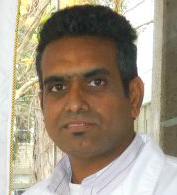With issues ranging from heart burn to bloating, Crohn’s
disease and bowel cancer, it’s estimated that 25 to 30 per cent of Australians
suffer from a gut disorder. Using model systems, Dr Raj Eri
(Associate Head
Learning and Teaching Biomedical Sciences and Head of Biomedical
Sciences at the University of Tasmania) and his team are
working to treat and eradicate some of these debilitating disorders.
Inflammatory bowel disease, which includes Crohn’s disease and colitis, has been the focus of Dr Eri’s research. Through careful and extensive cellular analysis, this research has led to ground-breaking findings. Dr Eri has discovered the bio-markers that point to early signs of gut disease, which is important for early treatment and better patient outcomes.
In order to understand the how and why behind these diseases, Dr Eri and his team have been collecting samples from patients and literally dissecting their findings, cell by cell, under the microscope.
“The current care plan for people with these diseases is through a systematic pain killer treatment that comes with several negative side effects.
We’re looking at natural therapy alternatives that don’t have the same harsh side effects so are much easier on the body but equally, if not more, effective than traditional methods.
Youth facing greatest impacts of disease
While many people face gut health issues, young people between the ages of sixteen and twenty-five are especially impacted. As more and more young people present with these issues, the burden on the Australian health system is now overwhelming, costing the Australian economy $3 billion dollars in management.
“Seeing the diminished quality of life of young people dealing with a gut disorder is what drives me to continue my research.
“During this crucial and special stage in life, young people should be discovering and exploring the world. But with these diseases overtaking their bodies, it really begins to impede on their social lives and general wellbeing.”
Looking to the future for natural and personalised therapies
Dr Eri’s natural therapy research includes identifying the role functional foods play in the treatment of patients with gut health problems. Using foods commonly found at the local grocer, Eri and his team are conducting clinical studies to see how some of these foods, those containing probiotics, help ease and eliminate gut disease symptoms from patients.
The profound findings in several of these clinical studies has caught the attention of people around the world, leading to key collaborations with probiotic companies and more grants to continue the research.
Looking to the future, Dr Eri is hoping to offer widespread personalised treatment plans for patients by looking at their gut bacteria, called the ‘gut micro biome’.
These beneficial bugs and bacteria in the gut are unique to each patient and not only play a huge role in gut health but in other diseases like diabetes, arthritis and autism as well.
“We’re looking at how we can manipulate this beneficial bacteria to help our patients with the management of their own gut health and other disease that lie outside of the gut.
“For me, science is second nature. Finding new discoveries day to day in my job and overseeing the research of my PhD students drives my questions and curiosity further," he said.
“Every day we are one step closer to finding a cure for people impacted
by gut disease.”
Interested in conducting your own research? Apply now to become a research student.
Find out more about the College of Health and Medicine here.
